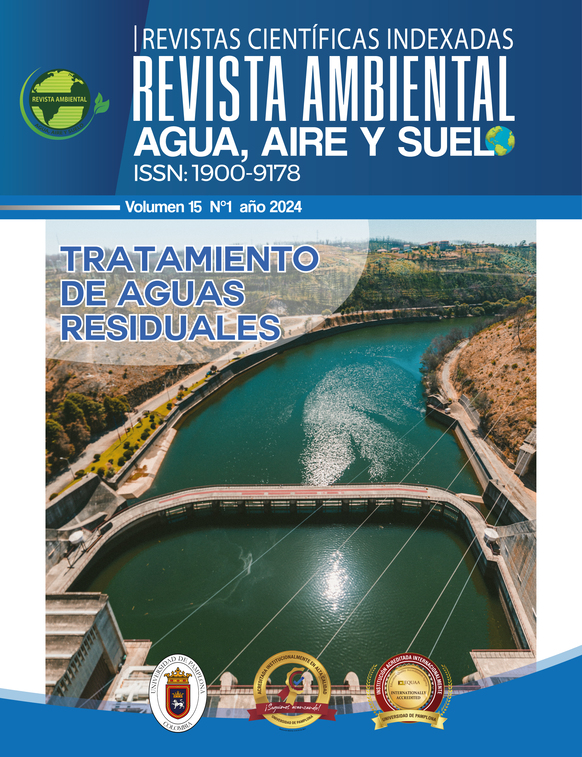Greenwashing, responsabilidad ambiental y huella de carbono: impacto en la productividad del sector industrial en Cúcuta
DOI:
https://doi.org/10.24054/raaas.v15i1.2920Palabras clave:
correlación, greenwashing, huella de carbono, productividad , ambientalResumen
Esta investigación aborda el problema del greenwashing, una práctica engañosa que algunas empresas emplean para parecer más responsables ambientalmente de lo que realmente son. Frente a este panorama, el objetivo principal de la investigación es examinar el impacto del greenwashing, la responsabilidad ambiental y la huella de carbono en la productividad de las empresas del sector industrial de Cúcuta. Para lograr este fin, se empleó una metodología cuantitativa correlacional, seleccionando una muestra representativa de 420 empresas de las 9364 que conforman el tejido industrial de la ciudad. Este muestreo se realizó con un nivel de confianza del 95% y un margen de error del 5%. El instrumento utilizado para recoger los datos alcanzó un nivel de diligenciamiento del 88,1%. Los resultados del estudio revelaron una correlación negativa moderada (-0,46) entre el greenwashing y la optimización de recursos, sugiriendo que un aumento en las prácticas de greenwashing se asocia con una disminución de la eficiencia en la gestión de recursos. De manera más significativa, se encontró una correlación negativa muy fuerte (-0,95) entre la huella de carbono de las empresas y su rentabilidad, indicando que un incremento en la huella de carbono generalmente resulta en una menor rentabilidad. La conclusión principal destaca la importancia de desarrollar e implementar estrategias que permitan a las empresas equilibrar eficientemente la responsabilidad ambiental con la productividad. Esto no solo mejora su sostenibilidad y rentabilidad a largo plazo, sino que también contribuye positivamente con el bienestar ambiental global.
Descargas
Referencias
Andrade, J. M., Osorio, L. M., & Pabon, J. A. (2020). Impacto económico del sector cerámico en San José de Cúcuta (Colombia). Obtenido de https://www.redalyc.org/journal/1872/187243745007/html/
Aranguren Gil, M. d. (2023). La sostenibilidad frente a las prácticas de Greenwashing: análisis en el sector textil. Madrid: Repositorio de la Universidad Pontificia Comillas. Obtenido de https://repositorio.comillas.edu/xmlui/handle/11531/57058
Camara de comercio de Cucuta. (2021). Comenzó el camino para la Nueva Zona Industrial de Cúcuta. Obtenido de https://sitioanterior.cccucuta.org.co/noticias-7-m/2319-comenzo-el-camino-para-la-nueva-zona-industrial-de-cucuta.htm
Chen, P., & Dagestani, A. A. (2023). Greenwashing behavior and firm value – From the perspective of board characteristics. Corporate Social Responsibility and Environmental Management. Obtenido de https://onlinelibrary.wiley.com/doi/abs/10.1002/csr.2488
Cloud, G. (2022). Los consejeros delegados están dispuestos a financiar una transformación sostenible. New York: Google. Obtenido de https://sustainability.google/intl/es_es/reports/google-cloud-cxo-sustainability-survey-final/
Córdoba, M. R., & Candón-Mena, J. (2020). Greenwashing, marketing ecologista y marketing ecológico: El caso de Mattel y Asia Pulp & Paper. Revista Internacional de Comunicacion y Desarrollo. Obtenido de https://revistas.usc.gal/index.php/ricd/article/view/7265
Falkner, R., & Buzan, B. (2023). La responsabilidad ambiental de las grandes potencias internacionales. Madrid: Anuario Internacional CIDOB 2023. Obtenido de https://raco.cat/index.php/AnuarioCIDOB/about
Gómez Velázquez, J., & Gómez García, J. y. (2023). Sostenibilidad e implementación de prácticas agroecológicas: El caso de tres sistemas productivos de café en la Costa Oaxaqueña. Mexico: Instituto de Investigaciones Económicas y Asociación Mexicana de Ciencias para el Desarrollo Regional. Obtenido de https://ru.iiec.unam.mx/6090/
Linares-Rodríguez, M. C., Gambetta, N. & García-Benau, M. A. (2023). Climate action information disclosure in Colombian companies: A regional and sectorial analysis. Urban Climate. Urban Climate. 51. Obtenido de https://www.sciencedirect.com/science/article/abs/pii/S2212095523002201
Mora-Contreras, R., Ormazabal, M., Hernández-Salazar, G., Torres-Guevara, L. E. Mejia-Villa, A., Prieto-Sandoval, V. & Carrillo-Hermosilla, J. (2023). Do environmental and cleaner production practices lead to circular and sustainability performance? Evidence from Colombian manufacturing firms. Sustainable Production and Consumption. Obtenido de https://www.sciencedirect.com/science/article/pii/S2352550923001367
Ramìrez Cuervo, A. M. (2023). Características, retos y oportunidades de los negocios verdes en Colombia, desde la experiencia de los emprendedores. Bogota: Universidad Libre de Colombia. Obtenido de https://repository.unilibre.edu.co/handle/10901/26191
Ruiz-Blanco, S., Romero, S., & Fernandez-Feijoo, B. (2022). Green, blue or black, but washing–What company characteristics determine greenwashing? Environment, Development and Sustainability, 24, 4024-4045. Obtenido de https://link.springer.com/article/10.1007/s10668-021-01602-x
Sebastiao Vieira de Freitas Netto, M. F., Ribeiro, A. R., & Soares, G. R. (2020). Concepts and forms of greenwashing: a systematic review. Environmental Sciences Europe, 32. Obtenido de https://link.springer.com/article/10.1186/s12302-020-0300-3
Suarez Gutiérrez, S. A. (2023). La relación del greenwashing y el green brand equity mediado por green perceived risk, green loyalty, green brand image, green satisfaction, green concern, green trust. Bogota: Universidad nacional de Colombia. Obtenido de https://repositorio.unal.edu.co/handle/unal/85407
Descargas
Publicado
Número
Sección
Licencia
Derechos de autor 2024 REVISTA AMBIENTAL AGUA, AIRE Y SUELO

Esta obra está bajo una licencia internacional Creative Commons Atribución-NoComercial 4.0.










